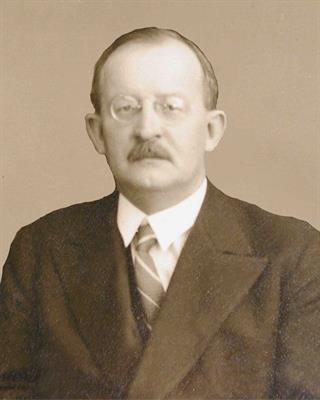Dr. Gustav Steinbauer

Personalia
Born:
Died:
Profession:
Persecution:
Imprisonment March 1938 (some time),
Prohibited from working 1938,
Banned from the city 1938
Memberships
Curriculum Vitae
Gustav Steinbauer graduated from the Jesuit grammar school Kollegium Kalksburg near Vienna, where he met Father Nivard Schlögl OCist (1864-1939), and subsequently studied law in Vienna. In 1909, he became the first member of the Franco-Bavaria student fraternity after it was founded on December 4, 1908. In 1913, he completed his studies with a doctorate in law, then embarked on a career as a lawyer and joined the law firm of Martin Ritter in Innsbruck in 1916. In 1917, he was drafted as a volunteer into Infantry Regiment No. 73 in Prague. He was deployed to the Isonzo Front and returned home as a retired ensign.
After the war, he founded the "Sportvereinigung katholisch-deutscher Hochschüler und Hochschülerinnen Arminia in Wien" in 1919 together with a number of sports enthusiasts. In 1924, he opened his own law firm, but then moved it to Mistelbach in 1927 due to the oversupply of lawyers in Vienna. Here he also became involved in local politics with the Christian Socialists, becoming deputy mayor from 1929-1938 and mayor of Mistelbach from February 12, 1938.
After the Anschluss, Gustav Steinbauer was imprisoned for some time and was banned from practicing his profession and working in Vienna after his release. During this time, he continued to endure regular house searches by the Gestapo. At the end of 1939, he was admitted to the bar again. Although he was classified as "unworthy of military service", at the advanced age of 55 he was nevertheless forced to enlist as an unworthy soldier in the last year of the war and was taken prisoner of war by the Americans in 1945.
From August 1945, he returned to Vienna to work as a public defender at the People's Court.
At the Nuremberg war crimes trial in 1946, the Vienna Bar Association drew up a list of defense lawyers from which he was selected by an American member of the tribunal at the request of the accused and took over the defense of Arthur Seyß-Inquart (1892-1946) - "short-term Federal Chancellor" and "Anschluss Chancellor", Reich Governor and Reich Commissioner for the occupied Netherlands from 1940-1945. Both had known each other as fellow lawyers before the Nazi era. The document situation is very difficult, the entire proceedings are largely conducted according to the Anglo-American legal system. Seyß-Inquart is sentenced to death and executed in Nuremberg on October 16, 1946. Although he did not share his convictions in the slightest, the overriding principle in Nuremberg was that everyone could expect a fair trial in accordance with the rule of law. This also distinguishes the Nuremberg Trials from show trials and gives them historical legitimacy.
Places
Residence:
Citations
Krause, Peter/Reinelt, Herbert/Schmitt, Helmut (2020): Farbe tragen, Farbe bekennen. Katholische Korporierte in Widerstand und Verfolgung. Teil 2. Kuhl, Manfred (ÖVfStG, Wien) S. 335/336.
Photo: Biolex des ÖCV unter www.oecv.at/biolex; Stand: 15.10.2022.
